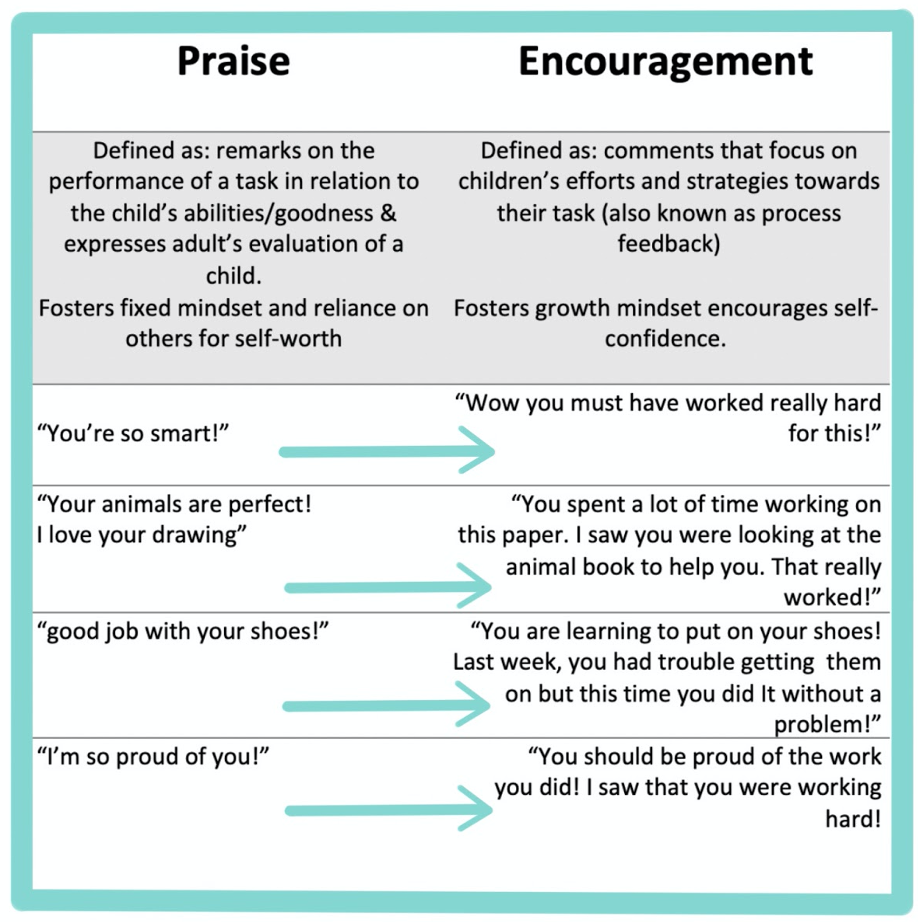As caregivers, both parents and school members alike are invested in the nurturing of a child’s self confidence and growth. When we interact with our children, we want them to feel loved, self assured, and develop intrinsic motivation towards their works and efforts.
In this post, we will talk about the importance of encouragement to our child’s learning and goals to further cultivate these positive attributes.
How adults talk to children about their accomplishments and actions can impact a child’s children’s self perception and learning. Praise is a common way for adults to respond to children’s behaviors and involves granting children approval for what they are or have done (f.e. “good job!”). Though praise makes our children smile, research suggests that it might have the exact opposite effect of what we want it to do. In fact, it shows that children who hear praise, are more likely to develop a fear of failure, avoid challenges, and depend on others for evaluation of self-worth (Kamins & Dweck, 1999, Mueller & Dweck, 1998, Harter, 1978).

When praise is called for, it should be given as encouragement. Encouragement calls for sincere comments made towards the efforts and strategies a child utilizes in their work (f.e. “you worked hard on this!”). This empowers your child by drawing from their intrinsic need to do work and invites self reflection. Encouragement also cultivates a growth mindset which can nurture self confidence and resilience when it comes to mistakes and failure.
“Encourage the deed [or effort], not the doer.”
Rudolf Dreikurs, psychiatrist/educator, (1897-1972)
Dr. Montessori’s ideas are reflective of the research shared above. The research by Kamins & Dweck (1999) shared above reflects the ideas and practices of Dr.Montessori. She had observed and studied children for many years and came across the idea that activities themselves can be rewarding which led her to see that praise and rewards were not always necessary. Children have intrinsic needs for productive work and rewards and praise may undermine that.
It is a common misconception that praise is not accepted in Montessori classrooms. Praise is not depended on or utilized often, but it is not forbidden. When it is given, it should be when a child is not in a period of concentration, so as not to interrupt them, and given as encouragement.

Especially in younger ages, children may turn to adults to share their findings and explorations. When this happens, praise as encouragement should be given warmly and generously. As mentioned earlier, this cultivates friendly feelings towards making mistakes and paves the way for a greater sense of self.
American culture holds a strong belief in praising children’s abilities (Schunk, 1994). It is very natural for us to turn to saying “good job” or “I loved it!” when we want to bolster the self esteem of our child. It will take some conscious effort to switch from using praise to encouragement. Encouragement allows us to relay that feeling we wanted to pass to our children through praise while also building that self confidence and resilience we want them to carry through to their futures.
For additional resources or any questions, we are always here. Reach out if you need us!
Till Next Post,
Aleezeh Makani & The Ethos Team
Ethos is a new mindset and model for child care and early education for children aged 6 weeks to 5 years in the South Boston, MA Area. We pride ourselves on our dedication to serving our students and families in ways that are research-driven and nurturing to who they are and can become. Request more information online here!